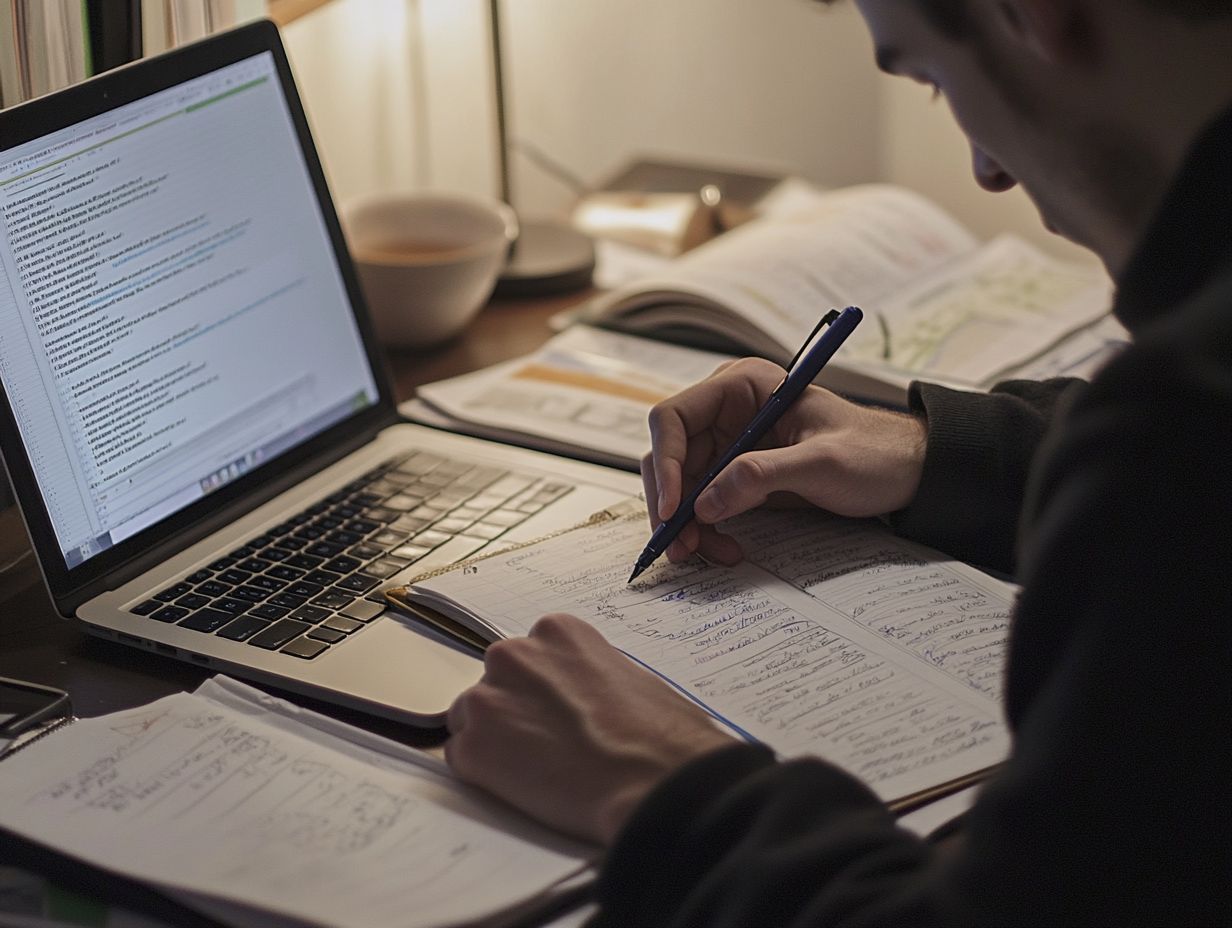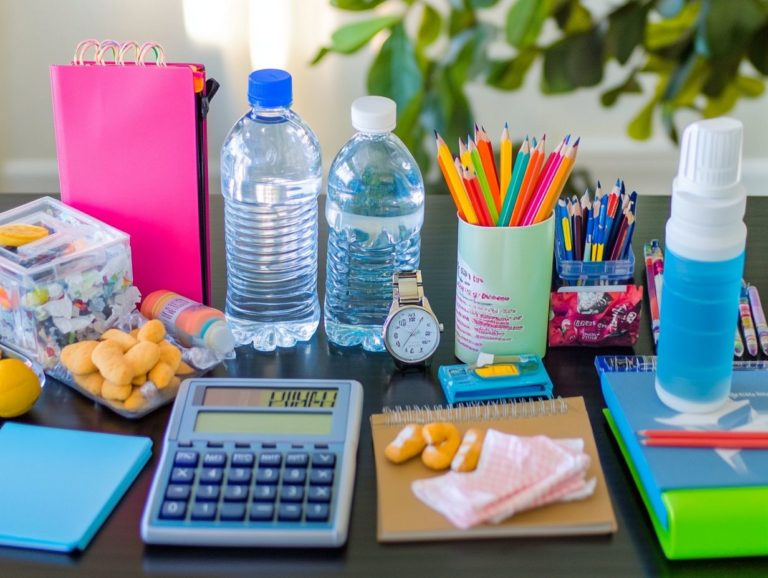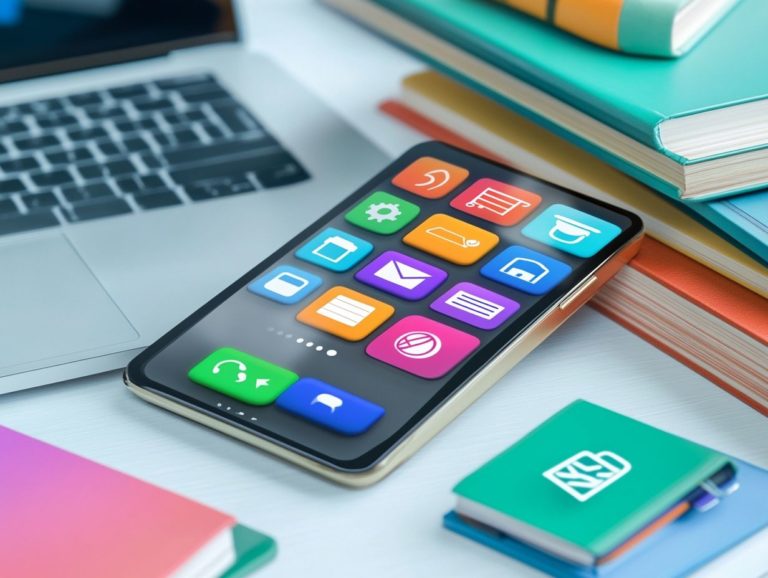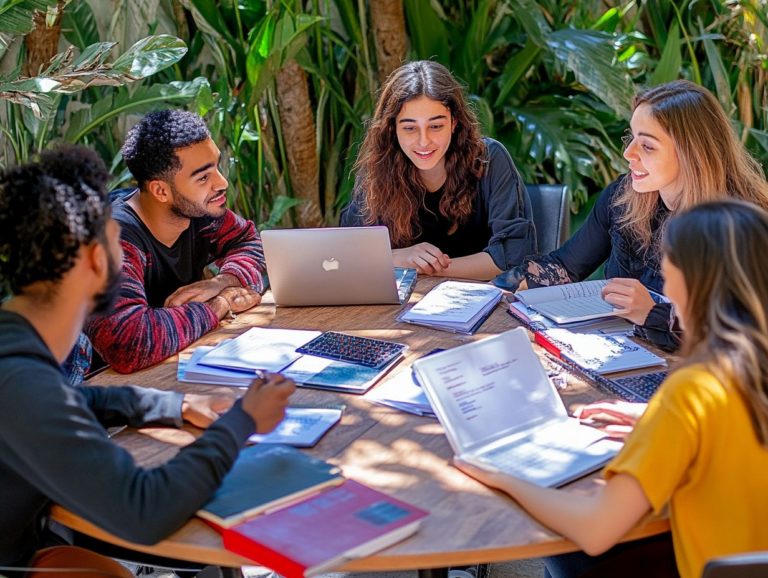the role of feedback in test preparation
Effective test preparation can set you apart, turning a simple pass into a remarkable achievement. This article explores the important part that feedback plays in refining your study methods and boosting your test scores. You will learn about various types of feedback and discover strategies to integrate it into your routine, all aimed at harnessing these insights for superior results. The discussion highlights how self-reflection can help you improve, offering practical tips to maximize the benefits of feedback throughout your preparation journey. Jump in now to discover ways to transform your approach and achieve your goals!
Contents
- Key Takeaways:
- The Importance of Test Preparation
- Understanding Feedback in Test Preparation
- Using Feedback to Improve Test Scores
- Strategies for Incorporating Feedback
- The Role of Self-Reflection in Test Preparation
- Incorporating Feedback into Study Techniques
- Maximizing the Benefits of Feedback in Test Preparation
- Frequently Asked Questions
- What is the role of feedback in test preparation?
- How does feedback help in improving test scores?
- What are the different types of feedback that can be utilized in test preparation?
- How can teachers effectively provide feedback to students during test preparation?
- Why is self-assessment an important component of feedback in test preparation?
- How can students use feedback to prepare for future tests?
Key Takeaways:

- Feedback is crucial for successful test preparation; it identifies areas for improvement and guides study strategies.
- Types of feedback, such as self-reflection and external input, enhance learning and lead to improved test scores.
- Incorporating feedback into study techniques effectively maximizes its benefits during test preparation.
The Importance of Test Preparation
Test preparation is essential for ensuring effective learning and meaningful assessment of your performance. It allows you to engage deeply with the content while honing vital skills. In educational settings, thorough preparation improves your retention of knowledge and elevates your confidence. Techniques like formative assessment, which helps you track your progress, and actively seeking feedback can ignite your intrinsic motivation and foster self-directed learning key components for academic achievement and professional growth.
Grasping the psychological aspects of test preparation can help you develop strategies to alleviate test anxiety, ultimately enhancing your performance in assessments.
Why Proper Preparation is Essential
Proper preparation sets the stage for your academic and professional success, enhancing your motivation and engagement in the learning process. When you re well-prepared, you approach challenges with confidence, fully aware that you have the skills and knowledge to thrive. This readiness elevates your motivation and encourages deeper engagement with the material, making it easier to connect concepts and apply them practically.
For organizations, investing in employee preparation translates into higher retention rates, as individuals feel valued and equipped to contribute meaningfully. In various learning contexts, timely and constructive feedback creates an environment that propels you forward, enabling reflection on your progress and fostering continuous improvement.
Understanding Feedback in Test Preparation
Understanding feedback in your test preparation is essential for enhancing your learning outcomes. It fosters a strong feedback loop that encourages continuous improvement, ensuring you refine your skills and knowledge effectively. Additionally, exploring the role of repetition in test preparation can further aid in solidifying your understanding.
Types of Feedback and Their Benefits
Various types of feedback can significantly enhance your learning experience, including peer feedback, instructor feedback, and real-time feedback, each serving a unique purpose. Peer feedback invites you to engage with your classmates’ work, fostering collaboration and sharpening your critical thinking skills. When you analyze a peer’s presentation, you offer constructive criticism and reflect on your own abilities in a supportive setting.
Instructor feedback provides personalized insights, helping you identify strengths and pinpoint areas for improvement, often guiding you in setting realistic goals. Real-time feedback, especially through digital platforms, allows for immediate performance adjustments, enhancing your skills right then and there. Collectively, these forms create a rich ecosystem that promotes autonomy and drives performance improvement.
Using Feedback to Improve Test Scores

Effectively utilizing feedback can greatly enhance your test scores by providing clear insights into your performance and highlighting specific areas for improvement. This targeted approach allows you to focus your efforts where they matter most, leading to more meaningful growth and success in your learning journey.
Strategies for Incorporating Feedback
Incorporating effective feedback strategies is essential for you to achieve your desired learning outcomes and enhance your performance. To optimize your learning experience, actively seek and use feedback from peers, mentors, and supervisors.
This approach helps you grow personally and fosters a culture of collaboration and open communication around you. Employing techniques like regular check-ins, constructive criticism, and setting specific goals based on feedback can lead to significant improvements.
You must create an environment where feedback is given thoughtfully, ensuring it is specific, timely, and focused on actionable insights. By embracing a continuous feedback loop, you can tailor your study techniques effectively, allowing you to adapt and thrive throughout your educational journey.
The Role of Self-Reflection in Test Preparation
Self-reflection is crucial in test preparation, allowing you to critically evaluate your understanding and customize your study techniques for peak performance. By taking the time to reflect, you can identify strengths and weaknesses, enabling you to fine-tune your approach and maximize your potential.
How Self-Reflection Can Enhance Learning
Self-reflection can significantly enhance your learning outcomes by helping you identify both strengths and weaknesses, which in turn informs your future study strategies. This reflective examination of your personal experiences fosters a deeper understanding of the material and heightens your engagement with the content.
By evaluating your past performance, you can pinpoint specific areas for improvement, whether it’s time management or comprehension skills. This process nurtures your metacognitive abilities, giving you the power to develop tailored approaches that resonate with your unique learning preferences.
Integrating self-reflection into your study routine on a regular basis can lead to improved performance assessments. As you become more adept at adapting to challenges and setting realistic, achievable goals, you’ll find that this enriched perspective not only boosts your academic success but also lays the groundwork for lifelong learning.
Incorporating Feedback into Study Techniques
Incorporating feedback into your study techniques is essential for enhancing knowledge retention and ensuring you effectively grasp complex concepts. By actively seeking and integrating feedback, you can refine your learning approach, making it more effective and tailored to your individual needs.
This practice not only solidifies your understanding but also gives you the power to navigate intricate ideas with greater confidence and clarity.
Methods for Using Feedback Effectively

Using feedback effectively means employing a variety of mechanisms and delivery methods that resonate with your cognitive psychology and unique learning styles. This approach promotes your skill development and creates an environment where you can feel more confident.
For instance, constructive criticism should be specific and framed positively, allowing you to see areas for improvement while also acknowledging your achievements. Engaging in methods such as peer reviews and self-assessments encourages you to reflect and take personal ownership of your learning journey.
Incorporating timely feedback whether through digital platforms or in-person discussions ensures that you remain continuously engaged and motivated. Ultimately, by tailoring feedback strategies to your individual needs, educators can significantly enhance your learning experience.
Maximizing the Benefits of Feedback in Test Preparation
Maximizing the benefits of feedback during your test preparation is essential for fostering your engagement and enhancing your overall performance assessment. Embracing constructive insights deepens your understanding and gives you the power to refine your skills and boost your confidence.
Tips and Tricks for Getting the Most Out of Feedback
Don’t miss out on leveraging the power of feedback! You can unlock its full potential by using various tips and tricks that enhance its effectiveness and relevance to your learning strategies.
By actively engaging with feedback mechanisms, you can create a lively learning environment where your team members feel empowered to share their insights. This open dialogue nurtures a culture of continuous improvement and strengthens collaboration across the team.
To boost the frequency of feedback, consider implementing regular check-ins or peer review sessions. These provide valuable opportunities for helpful talks.
Using technology, such as feedback tools or platforms, can significantly streamline the process. It makes it easier for your organization to gather and analyze input. This proactive approach ensures that learning opportunities are identified promptly, leading to improved employee performance and satisfaction.
Frequently Asked Questions
What is the role of feedback in test preparation?
Feedback plays a crucial role in test preparation. It helps students identify their strengths and weaknesses and understand the expectations of the test.
How does feedback help in improving test scores?

Feedback provides students with insights into their performance. It helps them understand where they need to improve.
By using this information, students can adjust their study strategies and focus on areas that need more attention. This ultimately leads to improved test scores.
What are the different types of feedback that can be utilized in test preparation?
Some common types of feedback used in test preparation include written comments, self-assessment quizzes, detailed scoring guides, and peer evaluation. These methods give students different perspectives and help them better understand their performance.
How can teachers effectively provide feedback to students during test preparation?
To provide effective feedback, teachers should ensure it is specific, timely, and constructive. They should focus on both strengths and weaknesses and offer suggestions for improvement.
Why is self-assessment an important component of feedback in test preparation?
Self-assessment encourages students to reflect on their performance. It helps them identify their strengths and weaknesses while promoting self-directed learning.
How can students use feedback to prepare for future tests?
Students can use feedback to make necessary adjustments to their study strategies. They should focus on areas that need improvement and set specific goals to track their progress in future test preparations.






